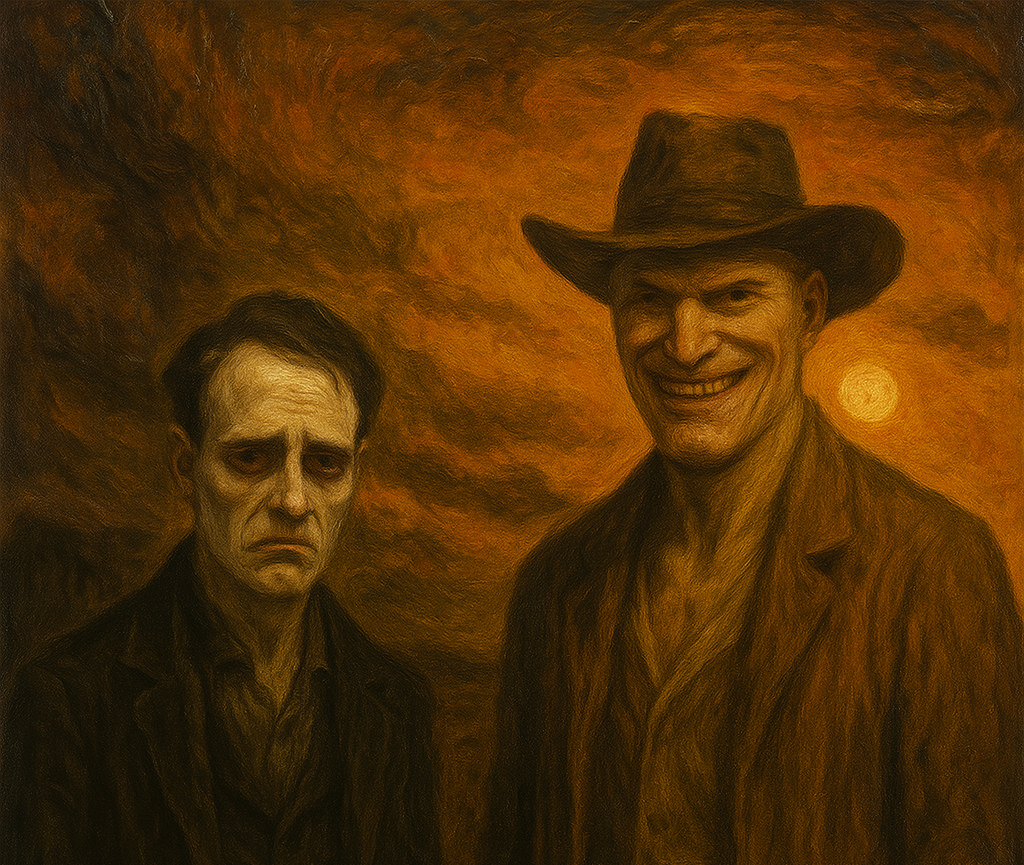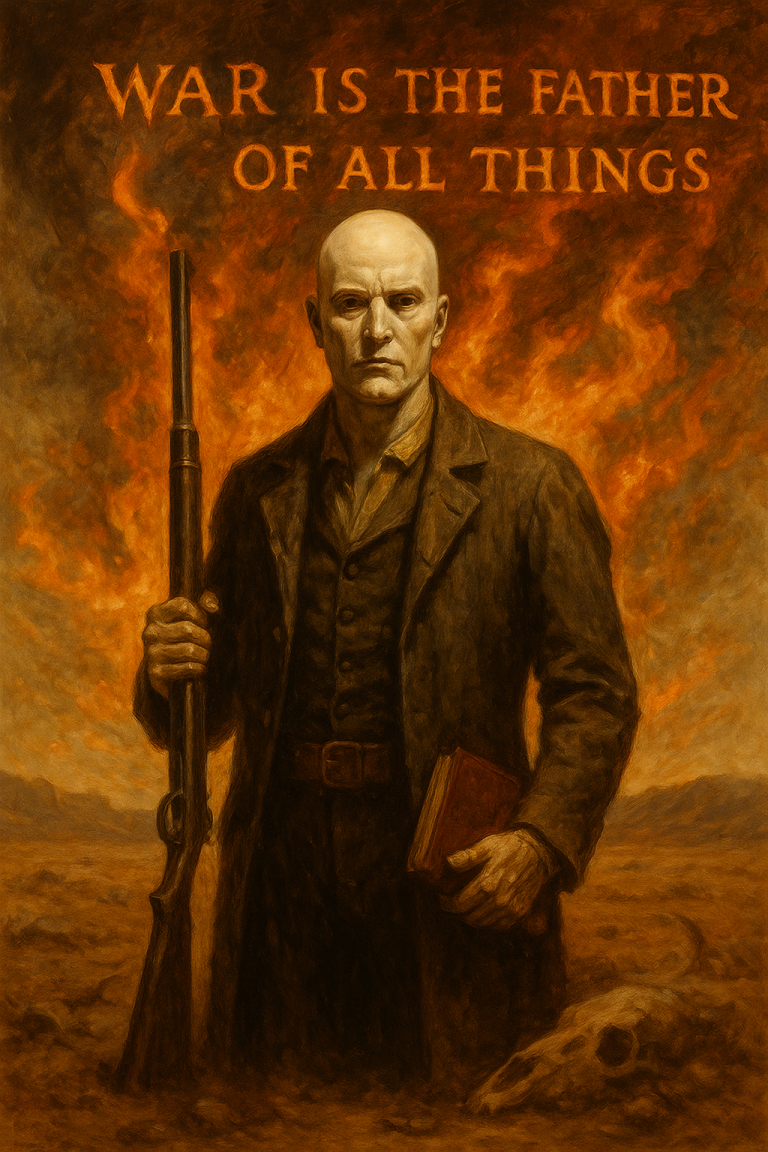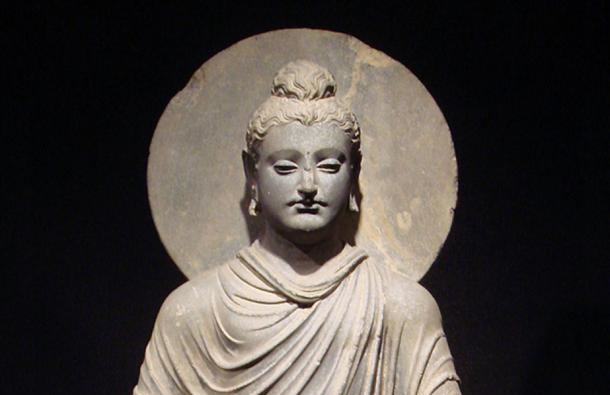
The Pale Criminal?
In Friedrich Nietzsche’s Thus Spake Zarathustra, the chapter titled “Of the Pale Criminal” presents one of the most enigmatic and psychologically rich parables in all of his philosophy. I must admit that when I first read it many year ago, I skimmed over it in fact, becoming increasingly frustrated with the mythopoetic style of Nietzsche’s writing, found it irritating, all that was left for me to say was ‘no wonder he didn’t sell many books when he was alive…’ But it clawed at me, haunted my thoughts, it’s one of those passages that I keep on coming back to especially now that the internet has once again discovered the fictitious (thank God) Judge Holden of the Blood Meridian saga by Cormac McCarthy.
Nietzsche’s Pale Criminal pre-dates McCarthy’s by about 100 years and is not just a murderer but a symbol of inner conflict, a being torn between primal will and a moral conscience that he does not understand. The Pale Criminal killed a man and then robbed him in order to justify the act! The urge came first, the act second, then came the remorse and finally it’s justification.
“Thus says the scarlet judge: ‘Why did this criminal murder? He wanted to steal.’ But I tell you: his soul wanted blood not booty: he thirsted for the joy of the knife!” – Nietzsche, Thus Spake Zarathustra.
Nietzsche being the genius that he was distils the man’s character, his drives, his very psychology into but a few mythopoetic paragraphs of prose, offering us a window into the turmoil of modern man, especially one who acts on instinct yet is haunted by guilt. The sickly feeling of instant regret is what made the man pale, the colour drained out of him by a tug of war between the Will to Power that demands that blood be shed and the awareness that scolds him for doing so. As far as Nietzsche is concerned it would be better for him to live without regret, to become the superman and transcend his own morality to live freely, regret being one of the most useless emotions of all, because it changes nothing… Even death is preferable to a life of mental, self-induced torture as Nietzsche makes clear within the following line:
“There is no redemption for him who suffers from himself, except it be a quick death.”
Nietzsche created a new cultural symbol for an archetype. I don’t know whether McCarthy had read any Nietzsche, but it is known that he was well versed in the art of philosophy so there is a chance that he may have encountered the Pale Criminal. It’s impossible to study philosophy without meeting Nietzsche, he is the king of all thinkers and probably the greatest moral philosopher to have ever lived…
The Swiss psychiatrist and father of analytical psychology Carl Jung would say that Nietzsche gave life to an archetype, his own term for a Platonic form, Jung was amongst other things a Neo-Platonist. McCarthy’s protagonist, the preternatural looking Judge, the tall pale white skinned man who delights in the destruction of innocence by any and all means, both intellectual and violent, is an embodiment of the baser aspects of Nietzsche’s Will to Power, both Pale Criminal and Judge Holden I suspect, are different symbols for the same archetype, the psychic representation of the bodily instinct to go against the morality of the herd and to kill, just for the joy of killing, just for its own sake. Unlike the Pale Criminal McCarthy’s judge however has no regrets, he does what he likes, and he likes what he does… He is what Jung would call the ‘shadow,’ of Nietzsche’s ‘Superman,’ representative of the baser aspects of the Will to Power.
It should be noted that Nietzsche’s alter ego, Zarathustra speaks not with condemnation, but with psychological insight. He recognizes that the Pale Criminal is not simply wicked. Rather, he is divided. His hand performed the deed, but his spirit recoiled. He lacked the strength to affirm his will, and in so doing became a battleground between desire and conscience, for Nietzsche there is nothing worse, because in such a state a man cannot be whole, the Pale Criminal is sickened by his own power and is symbolic of spiritual incoherence, he’s a soul that is unable to bear his own greatness and so collapses into guilt. Nietzsche asks us to affirm our actions whenever we act and to live with a conscious understanding of our own values, we must reconcile our instincts with our ideals, should we not, then we’re no different to the Pale Criminal.
It’s not just us! This delightfully modern condition is all too common in the wake of the death of God. All values are human made, and when measured against the cosmos of eternal space and time seem arbitrary or at best the products of evolutionary psychology, the consequence of mere physical law, physics describing chemistry, that in turn describes biology that in turn describes life. God is absent, not because he has left us, but because our love of science, the pursuit of material truth at all costs has killed him.
‘God is dead and we have killed him,’ Nietzsche famously said and oft repeated in not only the Joyous Science, but also near the beginning of Thus Spake Zarathustra, the idea of a divine image slain by the relentless materialism of human beings and the collapse of values that follows this as a type of intellectual maelstrom, a chaotic storm over the yawning abyss, the deepest dark of Nihilism manifested as a crisis of meaning in the psyche.
Only the bravest of thinkers are willing to admit the immense existential pain that comes from being unable to find a purpose that’s real, that can be proven, that holds everything together, that makes sense of life, that directs our actions, that gives our life importance, a reason for being, an ongoing telos that makes everything alright, the satisfaction of knowing that we exist for a reason, divinely willed into existence by a divine being who has gifted us a divine goal that is fully within our grasp, achievable in the now and something to be strived for… It’s agony and its name is loneliness, the most raw agony that can be felt for social animals like us. Prisoners are cut of from the herd for our protection and their punishment, but it’s not iron bars that makes a prison and neither is it the food, or the rough company of your cell mates, but instead it’s the never-ending loneliness of being separated from all that you hold dear, all of those that you love, all of those you’d like to kiss and to hug, that’s why it’s a punishment and that’s what separation from God feels like now that materialism can’t find him anywhere in the world of atoms and void.
“I looked and looked but I didn’t see God.” – Yuri Gagarin.
Speaking in 1961 about becoming the first human to enter space.”
The existential loneliness of being a single light in a cosmos separated from all others by enormous gulfs of mental space creeps up on you even in the most beautiful and blessed of moments, even when lying on the couch watching TV, even when attempting to fall asleep, the day’s duties, tasks and obligations long gone. It feels like the feverish love for an ex-girlfriend who unexpectedly dumped you, the longing for better times, the nostalgia of days gone by. ‘God is dead and we have killed him…’ The tempest blows in all directions, into all other pursuits, paths and pleasures making warfare, politics, hedonism and vice narcotics for sick souls lacking in meaning, void of purpose, each a single light shining against eternity and is soon gone.
“But when Zarathustra was alone, he spoke thus to his heart: ‘Could it be possible! This old saint has not yet heard in forest that God is dead!” – Thus Spake Zarathustra, Zarathustra’s Prologue.
Thus, our values are not ordained by God, they are not divine commandments that we must keep to please the Lord, and without such internal authority to guide our actions we are faced with two obvious choices, either to fall into the abyss of pessimistic nihilism or become pale criminals haunted by the shadows of moralities that we no longer believe in, but there is a third way. Nietzsche asks of us to instead live with more integrity. The higher man, the Übermensch, or Superman does not obey laws blindly nor fall prey to unconscious urges. Instead, he creates his own values and wills his deed entirely. To overcome the condition of the Pale Criminal, we must not only know what drives us but accept responsibility for our actions and align our instincts with our self-created values and then work hard to overcome shame by achieving inner unity. Thus, Nietzsche’s Pale Criminal is a mirror that invites us to look within and ask: Do I act with my whole being? Or am I split, am I mentally healthy or sick, pale, with one part of me doing, whilst another part judges?
The parable of the Pale Criminal challenges us to become more than moral or immoral, it asks us to become whole, Carl Jung would approve, to stop being ashamed of our strength, to no longer be pale and to finally become what Nietzsche calls “a creator of values.”
“Man first implanted values into things to maintain himself – he created the meaning of things, a human meaning!
“Therefore he calls himself: ‘Man’, that is: ‘the evaluator.’
“Evaluation is creation: hear it, you creative men! Valuating is itself the value and jewel of all valued things.
“Only through evaluation is there value: and without evaluation the nut of existence would be hollow. Hear it, you creative men!
“A change in values – that means a change in the creators of values. He who has to be a creator always has to destroy.” ― Friedrich Nietzsche, Thus Spoke Zarathustra (Of the Thousand and One Goals).

